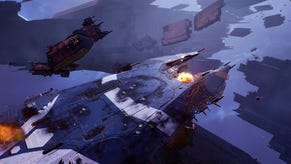Sun Dogs' Expansive (Then Contracting) Solar System
Solar system stories
I've been tinkering with Sun Dogs [official site] today. It's a transhumanist exploration game by Nic Tringali and Rebecca McCarthy that has you moving around the solar system of the future collecting story snippets and sometimes artifacts or bodily upgrades. It does an excellent job of creating this sense of a bio-tech-dominated spacescape and infusing it with a sense of scale, but the more I played the more I also saw its limitations:
When you play you're looking at this simplified 2D map of the solar system. When you're up close to a planet you might see a couple of points of interest - orbital space stations, maybe a major settlement or two, or a moon drifting around. If you zoom out for a macro view you'll see planets and dwarf planets as well as their orbits. Navigating to different points you just click but the blob that represents you (a consciousness implanted in a body which is referred to as a "sleeve") and your ship will arc towards the target, swooping in to intercept it and maybe taking a couple of orbits of a planet or moon to do so. It's charming.
At the moment I'm on the edge of the inner solar system, trying to find a way to Jupiter. I think I need to head to Ceres or Vesta or Pallas and time it so that I arrive when it's near its aphelion AND its aphelion is closest to Jupiter (i.e. so that the jump from my location is as short as possible to Jupiter because I'm as far out as possible and Jupiter is within range). I'm enjoying experimenting with the jumps but would prefer to be able to plan those jumps a bit better and predict the movement of the planets. I mean, at this point I have spent more than 20 earth years trying to make those jumps intersect. COME ON.
The main meat of Sun Dogs is the storytelling, though. When you're at a location you can click explore and the game dispenses a story fragment. Some result in you getting items or upgrades for your sleeve but far more often you'll receive a snapshot of an experience. Your character will watch space yachts cruising past, spend an afternoon in conversation with a local stranger, encounter a possibly-virtual parrot, observe the comings and goings at a traffic point... I felt like I recognised nods to M John Harrison in particular but maybe that's because I was reading Light fairly recently and it touches on similar ground.
I found it hard to sink into the game at first - I think that's partly because the way the snippets are presented means they just appear on top of the interface with no obvious border or separation so I struggled to ignore the background as I read. But once I did get the hang of absorbing the words, I really liked the writing. Combined with the dreamy engine throbs and electronic pulses of the soundtrack it was easy to get a sense of this future place. It's enormous. It's lonely. Events often take place at great scale and so both error and natural phenomena are often catastrophic for your sleeve. A death means resetting in a new sleeve, with the memories you most recently saved, at an upload point. It contributes to this feeling of being an outsider or a tourist. You're in this transient form, you don't get to keep your possessions, you can't build a home or a stable physical identity.
All of this I really liked. But the longer I played the more I encountered repetition of the events or snippets. The solar system started to feel small again so I started to click the explore button less frequently, not wanting to unearth more repeats and shrink the space further.
I also started to feel a little frustrated by the random nature of a lot of the events, particularly the deaths. Some were interesting but generally it felt like fatal events came too frequently for me to make use of any items or augments I'd accrued, as I needed to start from scratch again and again. It's here that I felt the player came into conflict with the sleeve conceit, too. On death your character reverts to the most recently uploaded version of itself so it would have no memory of some of the things the player does. The more you play the more the player and the avatar would diverge (unless there's a twist I haven't encountered).
There's a menu space for "missions" but I didn't encounter anything that populated the mission menu nor any hints on where they might be. That's not necessarily a problem in a game about exploration, but it would have been nice to see trails that lead you in promising directions. As it was, that tab stayed resolutely empty for me.
I fared better in acquiring genetic upgrades and space trinkets/items but the deaths meant I didn't hold onto any for long. All I can boast at the moment is temporary ownership of some corporation data. I lost my fancy clothes and my carnivorous plant to some space disaster or other pretty early on. I had a nice sleeve for a while but that got obliterated when I was killed by a strange book.
The most interesting element of Sun Dogs for me now, after this initial period of finding out what the game is, is the possibility of mods. As per the game description there is a "Full modding system allowing additions or rewrites to the entire game." There's a bit more info on how that works here on the dev blog. At this point I'm waiting to see what other people do with the system and whether it becomes a platform for further/different storytelling.
Sun Dogs is on Steam for $9.99 (£6.99) and Itch for $10.












